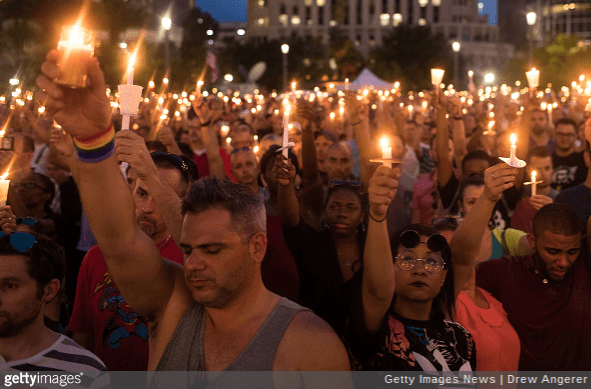Events in our national life are often sadly familiar. That is certainly true of the Orlando shootings this past weekend. Mass violence. Contentious claims about Islam and domestic terrorism. The nation briefly rallying in solidarity. Prayers, anguish, and calls for change. Probable failure to address the root causes. An almost inevitable repetition in the near future.
What is also becoming familiar, however, is a certain reaction to this reaction, especially the prayer. Within hours of the attack, I saw memes on Facebook like the phrase “Pray for America” with the “Pray” crossed out and the words “Policy Change” written beneath.
This is not a wholly new phenomenon. “Prayer shaming” was a prominent element of the reaction to the San Bernardino shootings in December 2015.1 Of all the things to capture our national attention in the wake of disaster, it was prayer and its efficacy.
Many said that messages for “thoughts and prayers” were at best useless, and at worst destructive. At the time, I was inclined to dismiss much of it as anti-Christian bigotry. But it was harder to ignore the Dalai Lama when he weighed in:
We cannot solve this problem [of terrorism] only through prayers. I am a Buddhist and I believe in praying. But humans have created this problem, and now we are asking God to solve it. It is illogical. God would say, solve it yourself because you created it in the first place.
The Lama affirms the value of prayer, but he also argues that it is not enough. His words led me to reflect on prayer, politics, and our response to tragedy.
***
I have to admit that the “prayer shamers” get a few things right. First, many public figures who sent their “thoughts and prayers” can seem more interested in consolidating their moral bona fides than expressing compassion. It is probably no coincidence that many politicians who expressed their thoughts and prayers are also stalwartly opposed to gun control.
There is further no doubt that the phrase “thoughts and prayers” risks becoming a trite expression that one says as mindlessly as “you, too” when a waiter tells you to enjoy your meal. As Ruth Graham wrote, “This week’s prominent ‘prayer shamers’ aren’t really against prayer. They’re against platitudes.”
Second, action matters. Prayer can and should lead to action, particularly when that action is urgently needed. After the San Bernardino shootings, Senator Chris Murphy tweeted:
Your “thoughts” should be about steps to take to stop this carnage. Your “prayers” should be for forgiveness if you do nothing – again.
— Chris Murphy (@ChrisMurphyCT) December 2, 2015
It would indeed be the height of hypocrisy for Christians to voice loudly their prayers in the marketplace but stop short of doing good deeds for others. I believe that this need for action is what the Dalai Lama was getting at.
Third, prayer is not just for petition, and it is not just for crises. “Deliver us from evil” has been the defining prayer after such incidents of violence, and it is exceedingly petitionary. But Christians also pray to confess our belief in God, to give thanks for His generosity, to express our contrition, and simply to praise His name. This is well-expressed in the “Our Father.” If we are willing to learn from this prayer-shaming episode, we might ask ourselves: when I ask God to deliver me from evil, am I doing so in the context of a relationship with God? Do I hallow His name? Do I pray for His Kingdom to come, or do I just ask Him to rescue my little corner of it?
***
Just because the prayer shamers get some things right, it’s important to be clear about what they get wrong.
First, and foremost, petitionary prayer in times of crisis is important. Petitionary prayer gets an undeservedly bad rap, often trivialized by those who take themselves to be spiritually sophisticated. At our best, it is with the faith of a child that we ask God for something in prayer. At times, we ask Him directly for help, for an immediate solution, for a particular thing. But we can also ask for comfort or wisdom, for guidance and spiritual freedom. Indeed, even when we are able to see what we need to do, we still need grace and guidance to do it.
Moreover, it is consistent with 2500 years of Judeo-Christian faith that people turn to God in times that try their souls. Even when we don’t always live our faith in Christ, Christ is there, and we turn to Him instinctively in the moment of testing. Sure, this may seem like a sign of weak faith, but it is faith nonetheless, and quite possibly through it such difficult moments can lead to an experience of conversion.
This is why I find the Dalai Lama’s statement unsatisfying. It sounds too much like “God helps those who help themselves,” that famous maxim of the Gospel according to Benjamin Franklin. Yes, humans sin, and, yes, humans need to persevere to avoid sinning and to pay the consequences of those sins. But we won’t be able to do any of that without God’s help. In that sense, I could not disagree more with the New York Daily News’ headline: “God Isn’t Fixing This.”
Moreover, in all these dimensions, prayer is a fundamentally contemplative and receptive posture, one that politics dominated by ideology sorely lacks. Prayer and action are not mutually exclusive, as though all of our silly praying was the one thing keeping us from solving all of our problems through the power of reason.
And let’s be clear: we need to pray if we are going to look evil in the face. Acknowledging the presence of evil in the world is hard work. All too often we think we can solve the problem of evil by developing the proper technology or policy.
But evil is not a technical problem. We have to be willing to stare long and hard at it – and at ourselves – if we are going to learn something from it. Indeed, my worst fear about prayer shaming is that much of it is rooted in a denial of the presence of evil in human affairs.
All of the reasons we pray – to ask for help, to share our anguish and loss, to cry out for love, to confess our faith, to give thanks, to express contrition, to praise – are acts that make us better people and better citizens. Let us pray that we respond to that challenge.


